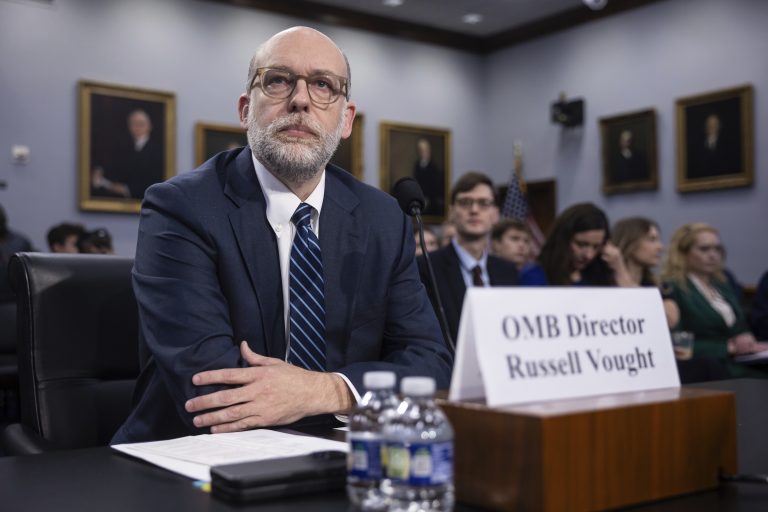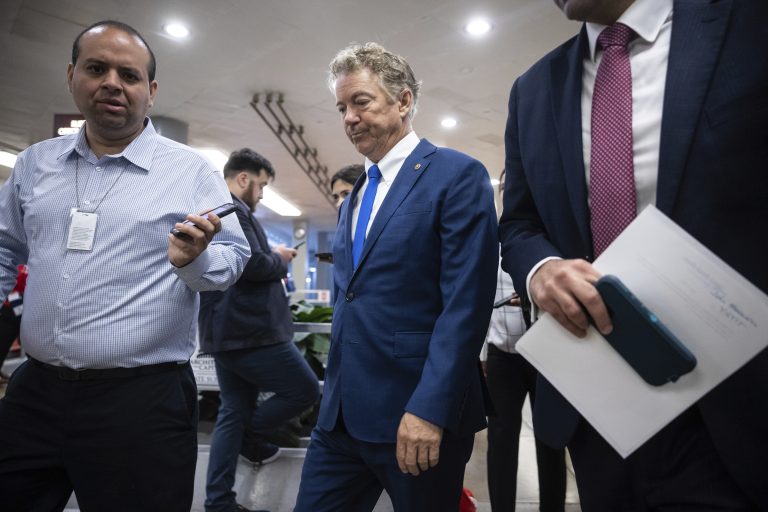Russ Vought’s relationship with Republican appropriators was already strained. Then he started talking about pursuing the ultimate end-run around their funding power heading into the fall.
The White House budget director has been persistently touting the virtues of “pocket rescissions,” a tactic he has floated as a way to codify the spending cuts Elon Musk made while atop his Department of Government Efficiency initiative, and which the federal government’s top watchdog says is illegal.
On Capitol Hill, leading GOP appropriators see Vought’s comments as another shot against them in an escalating battle with the Trump administration over Congress’ “power of the purse.” And they warn that the budget director’s adversarial posture hinders their relationship with the White House as they work to head off a government shutdown in just over three months.
“Pocket rescissions are illegal, in my judgment,” Senate Appropriations Committee Chair Susan Collins (R-Maine) said in a brief interview this week, “and contradict the will of Congress and the constitutional authority of Congress to appropriate funds.”
To hear Vought tell it, a “pocket rescission” is a legitimate tool at the executive branch’s disposal. In such a scenario, President Donald Trump would issue a formal request to claw back funding, similar to the $9.4 billion package he sent lawmakers this month to cancel congressionally approved funding for public broadcasting and foreign aid.
But in this case, the memo would land on Capitol Hill less than 45 days before the new fiscal year is set to begin Oct. 1. By withholding the cash for that full timeframe — regardless of action by Congress — the White House would treat the funding as expired when the current fiscal year ends on Sept. 30.
The dizzying ploy is another means toward the same goal Trump has been chasing since Inauguration Day: to spend less money than Congress has explicitly mandated in law. But the Government Accountability Office says the maneuver is unlawful, and the GOP lawmakers in charge of divvying up federal funding are wary that Vought is now talking about it in the open.
“I understand we want to use all the arrows in our quiver, and he wants to use all his,” Rep. David Joyce (R-Ohio), a senior member of the House Appropriations Committee, said of Vought in an interview. “But every time you pull out an arrow, you have to be ready for the consequences, right?”
Joyce continued: “It’s going to change the course of conversations and how each side works toward coming to resolution going forward.”
Vought declined last week to elaborate on his intentions, when pressed in person on Capitol Hill about his plans to use the ploy in the coming months. His office also did not return a request for comment. However, the budget director laid out a detailed argument for the maneuver on television earlier in the month — then mentioned it again as he left a meeting with Speaker Mike Johnson and then during a later hearing with House appropriators.
“The very Impoundment Control Act itself allows for a procedure called pocket rescissions, later in the year, to be able to bank some of these savings, without the bill actually being passed,” Vought said on CNN. “It’s a provision that has been rarely used. But it is there. And we intend to use all of these tools.”
Rep. Mike Simpson of Idaho, who chairs the appropriations panel that funds the Interior Department and the EPA, recently warned that the gambit is “a bad idea” that “undermines Congress’ authority,” after saying last month that he thinks “it’s illegal” for a president to withhold funding lawmakers approved.
But many top Republican appropriators — while scoffing at Vought’s comments — aren’t willing to engage in rhetorical arguments about the bounds of the president’s spending power.
“Talking is one thing. We’ll see if he actually does it,” Rep. Ken Calvert (R-Calif.), who chairs the appropriations panel that funds the military, said about Vought’s comments.
“He’s got his ideas,” said Rep. Steve Womack (R-Ark.), chair of the appropriations panel responsible for funding the departments of Transportation and Housing.
“I’d have some concerns about it,” said Rep. Robert Aderholt (R-Ala.), who chairs the appropriations panel that funds the departments of Education, Labor, and Health and Human Services — all targets of Trump’s deepest funding cuts.
Tension has been building for months between those Republican appropriators and Vought, who has a history of testing the limits of funding law: When he served in this same role during Trump’s first administration, he froze aid to Ukraine in a move that helped set the stage for the president’s first impeachment trial.
Republican funding leaders are irked that the White House has yet to deliver a full budget request, which appropriators rely upon to write their dozen funding measures. Vought has already left open the door to withholding the new money if the administration doesn’t agree with the spending priorities in the final bills.
They also say the president’s budget director and other Cabinet secretaries have withheld essential information about how they are using federal cash as the Trump administration fights off more than 100 legal challenges around the country. The suits are seeking to overturn the White House’s freezing of billions of dollars Congress already approved for myriad programs and agencies.
House Appropriations Chair Tom Cole (R-Okla.) issued a rare rebuke of Vought this spring for taking down the public website showing how agencies are expected to disburse federal dollars.
But the Oklahoma Republican generally avoids any public criticism of the Trump administration and is not sounding off now about Vought’s embrace of pocket rescissions. Cole said this month that he would “look at each individual” request the White House sends to claw back funding, now that the House has passed the $9.4 billion package to nix money for foreign aid and public broadcasting.
That package of funding cuts now sits in the Senate, where some top Republicans are interested in tweaking the plan to protect funding for preventing AIDS around the world and supporting PBS programming in their home states. Sen. Ron Johnson (R-Wis.) suggested Vought’s public comments about using pocket rescissions could be intended to encourage reluctant senators to clear it.
“Maybe that’s the way to let members know: Vote for the ones he sends up,” Johnson said, noting that he would be “totally supportive” of Vought using the tactic this fall.
Another Senate fiscal hawk, Homeland Security and Governmental Affairs Chair Rand Paul (R-Ky.), said he believes the law “does allow for pocket rescissions.”
“I think the president should have more power not to spend money,” Paul told reporters last week. “So if we have a way to reduce spending, by all means, we should use it.”
No court has ruled on the president’s power to cancel funding by sending Congress a request and then running out the clock at the end of the fiscal year. But GAO has twice weighed in.
In 2018, the watchdog found that the law “does not permit the withholding of funds through their date of expiration.” Vought, though, likes to cite an older GAO conclusion from 1975: It determined that Congress was unable to reject then-President Gerald Ford’s requests to claw back funding “in time to prevent the budget authority from lapsing.”
Katherine Tully-McManus contributed to this report.


